
T-Mobile's new plan lets customers upgrade their phones whenever they want, up to three times a year.
The "Jump On Demand" program is essentially a phone leasing program. You can trade in your borrowed phone for another one as long as you keep paying your monthly wireless bill to T-Mobile (TMUS).
It's kind of like a car lease. You can choose to never own the device (always returning it to T-Mobile when you're done with it). Or you can pay off the remaining balance at the end of the lease.
If you're addicted to always having the latest gadget, this plan is particularly attractive. You can start leasing an iPhone 6 today -- but you can still trade it in when Apple, probably a few months from now, releases its iPhone 6S (or whatever it will be called).
"Jump on Demand" offers customers the ability to walk out of the store with a new phone, paying nothing for the device upfront.
T-Mobile has a similar "Jump" plan, but it requires an additional $10 a month for the option to trade in your phone every six months. The new plan ditches the $10 a month fee and the six-month wait time.
If you trade in your old phone, the new plan lets you get an iPhone 6 for $15 a month over the course of an 18-month lease. If you want to keep it, you'll have to pay $164 at the end of that period.
The 10 million T-Mobile customers on the current "Jump" plan need to pay off their device before going onto "Jump on Demand."
T-Mobile said it's trying to cater to the 47% of the public that wishes their carrier would let them upgrade more often. According to the company, the average person keeps their phone for 20 months. "Jump" customers already beat that with 14 months.
"Jump on Demand" could bring that much lower.
"Whatever will make your life better -- that's what we're going to do," said T-Mobile chief marketing officer Andrew Sherrard. "This lets you say, 'I get a brand new smartphone whenever I want it.'"
This is yet another round of T-Mobile's "uncarrier" strategy to become the populist, customer-friendly cellular company. In the past two years, T-Mobile has eliminated contracts, killed roaming fees, slashed per-minute and text charges, and started letting customers upgrade phones and roll over unused data.
Other carriers, including Verizon (VZ), AT&T (T) and Sprint (S), have launched early upgrade plans over the past couple years. But T-Mobile criticized those plans as being two-year contracts in disguise.
T-Mobile noted that when Verizon launched its Edge upgrade program, it required customers to pay off 50% of their phone before switching to a new phone. That went up to 75% in October 2014, then 100% in May. The AT&T Next 24 plan won't let you upgrade until you pay off 80% of the device.
"Verizon's quietly turned their 'early upgrade' program back into a two-year contract -- as if nobody'll notice. And AT&T isn't much better. These guys just don't get it," said John Legere, T-Mobile's CEO, in a statement. "So, while they make you wait longer and pay more, we're changing the game again with Jump On Demand."
Jump on Demand will kick off on Sunday, June 28.


